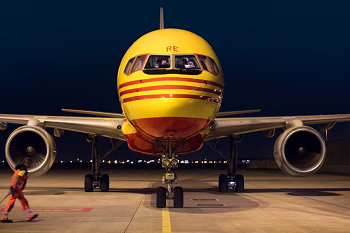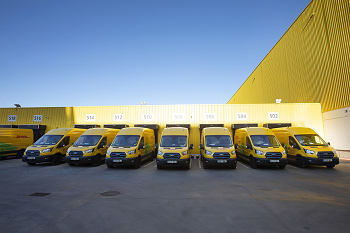DHL Express is opening its new international hub in Barcelona in September, in which it has invested 80 million euros.
DHL Express is the DHL Group’s business unit dedicated to urgent international deliveries – a rapidly growing business in step with the expansion of online shopping. With over half a century of experience, the company has had to adapt, like all companies in the industry, to the rise of e-commerce and new logistics demands.
Its operations in Spain began in 1979 with offices in Madrid and Barcelona, focusing mainly on the express delivery of documents by air, a pioneering service at the time. Since then, it has grown to become the leading operator in its niche in the country, with a strong network of centres located throughout the country and a workforce of over 2,300 employees. It currently offers fast door-to-door delivery of documents and parcels in more than 220 countries and territories around the world.
 n
n 
How is the DHL Express logistics network structured in Spain?
We have three international hubs located at Madrid-Barajas, Barcelona-El Prat and Vitoria Gasteiz-Foronda airports. These hubs are large logistics centres that operate as central connection points within the company’s international network. There are in addition six national gateways in Alicante, Palma de Mallorca, Santiago de Compostela, Seville, Valencia and the Canary Islands. We also have 42 facilities located in different Spanish provinces. From Spain, we manage a fleet of 16 of our own aircraft operating on domestic and international routes, and we operate over 40 of our own daily flights, as well as having 26 commercial routes. All this allows us to connect Spain with Europe, America, Africa and other destinations.
What is Spain’s role in the company strategy?
Spain plays a strategic role in the global DHL Express network thanks to its advanced logistics infrastructure and its geographical location, unrivalled as a bridge between Europe, Africa and, especially, Latin America – a very attractive and advantageous market for Spanish SMEs in the current international tariff context, and to which we operate up to 150 flights a week from Spain. Spain is not only an operational region for DHL Express, it is a strategic centre of innovation, talent, sustainability and international expansion for the DHL Group.
What kind of companies does DHL Express work with?
We support companies of all sizes, but our main focus is on SMEs. One of our priorities as a company is to support Spanish SMEs with their internationalisation and business expansion processes. We provide them with a wide range of specialised services, regulatory and customs advice, digital tools that allow them to track their shipments in real time, personalised support and competitive rates. The largest percentage of our clients in Spain are SMEs.
Which industries stand out in your activity?
We operate across all industries, with fashion, retail, automotive, and engineering and manufacturing standing out as the most significant. I would also emphasise our strong position in international express transport of medical and pharmaceutical materials, which, given their critical nature, demand complex logistics with temperature control, high security and compliance with very strict delivery times.
Which project would you single out as particularly significant for the company?
I believe that the real strength of a company lies in having motivated teams, since they are drivers of innovation. That is why I would highlight our ambitious human resources programmes, aimed at talent development, workplace well-being and the organisational sustainability of our workforce. These initiatives earned us a place in 2025 – for the sixth consecutive year – among the ten best companies to work for in Spain in the prestigious independent Best Workplaces ranking, which is based on employees’ own opinions and which the company topped in 2024. Going forward, we will continue with the programmes that are already in place, maintain our focus on a ‘safety first’ culture – because we can only be a great place to work at if we are a safe place to work at – and continue supporting effective internal talent programmes, ensuring that every employee has an individual development plan. Approximately 90% of newly created jobs are filled through internal promotion processes.
Is sustainability a major challenge for DHL Express?
More than a challenge, I would say it is a clear commitment. DHL Group was a pioneer in the logistics industry when it announced its GoGreen climate protection programme back in 2008. We aim to achieve zero emissions by 2050, with the interim step of reducing our CO2 footprint to below 29 million tonnes by 2030. By that same year, we are also aiming for 30% of our aviation fuel to be sustainable (Sustainable Aviation Fuel – SAF). Furthermore, as we move forward we will continue to expand our already broad offering of low-emission logistics solutions. We have deployed numerous sustainability programmes for our customers, but one of our flagship solutions is GoGreen Plus – an innovative service that enables companies to reduce the carbon emissions associated with their air shipments through the use of SAF. In just two years since its launch, over 10,000 companies have signed up for GoGreen Plus in Spain, representing approximately one third of the shipments handled by the Spanish subsidiary. Our customers are looking for ways to decarbonise their supply chains, and we are here to support them with this important challenge.
What investments do you plan to make in Spain in the future?
This September, we inaugurated our new international hub at Josep Tarradellas Barcelona-El Prat airport, in which we have invested 80 million euros. This year, we will also open a new operational facility in Gerona and we have planned an investment of over 40 million euros in Vitoria to create what will be our second largest aircraft maintenance hangar in Europe, with our largest being the one in Leipzig (Germany). It is expected to be operational in 2027.
Photos: DHL Express



